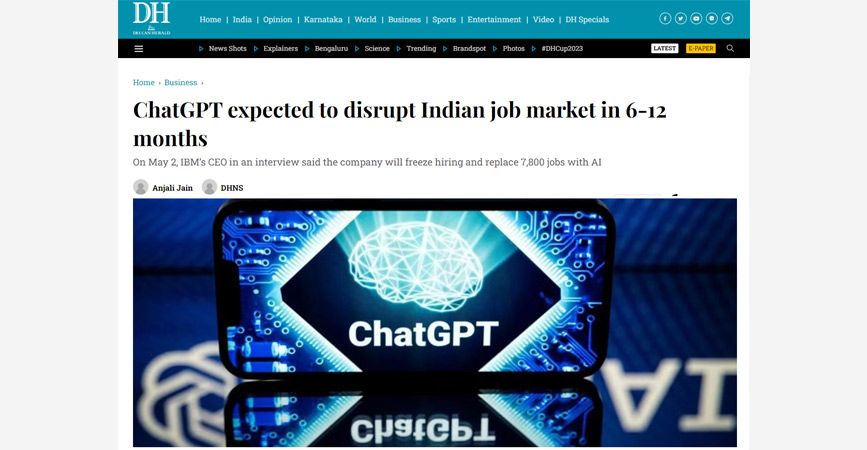
India Inc is warming up to ChatGPT, the shiny new AI toy that has taken the world by storm.
While a few companies are already experimenting with OpenAI’s artificial intelligence chatbot, human resource professionals are confident that the disruption to the job market will become more apparent in six to 12 months. However, most are averse to having this linked to lay-offs.
Experts also have a word of caution as the nascent technology poses data privacy and security risks that most might not be aware of.
There has been an uptick in demand in recent months with many firms introducing ChatGPT to test out its potential. Others like Air India and micro-blogging platform Koo have been faster in employing the technology to their benefit.
Last month, Koo — India’s rival to Twitter — integrated ChatPT on the platform to assist users in creating posts. The startup, which laid off nearly one-third of its workforce over the past year, has also been using ChatGPT internally “very actively in the last one month”, mostly on the back-end to “deeply integrate” some engineering practices, chief technical officer Phaneesh Gururaj told DH.
“He stressed that the layoffs are not connected with leveraging the AI technology, but agreed that there will be some roles in the industry where “obviously GPT will help in making things faster at a lower cost”.
Employee health insurance firm Plum has gone a step further and rolled out ‘PolicyGPT’, an AI chatbot built atop OpenAI’s GPT-3.5 API. It helps clients in getting a faster resolution for policy-related queries, eliminating the need for a customer service team. The company still has a smaller team of human agents for due diligence as the application is only 96.3 per cent accurate at the moment.
“The technology is young right now, so instead of having life-critical cases, companies need to take soft cases to launch and start experimenting. Get the feedback, find more confidence and then do more mission critical applications of this,” Plum CTO Saurabh Arora suggested.
On May 2, IBM’s CEO in an interview said the company will freeze hiring and replace 7,800 jobs with AI.
As per Janet Paul, Director, Human Resource, APJ & ME at Securonix, there are a number of cost benefits that companies will reap by employing generative AI technologies like ChatGPT, as they can cut down on not just employee pay-cheques but also office space, transportation and social security benefits.
Companies could look at making the most of their existing workforce by increasing efficiency through the use of AI rather than expanding their payroll.
Smaller businesses could leverage the tech to repurpose existing employees than hire new ones, others said.
It could also give companies more bargaining power over employees, especially those on the junior level, said Ashutosh Khanna, Co-Founder & Director, WalkWater Talent Advisors, a Bengaluru-based executive search firm.
“If you follow the trend of some of these big companies that have laid off people in big numbers, you will see within some time that they’ve invested in AI technology,” Paul underscored.
Underlying risks
Most experts DH spoke to highlighted that companies should tread the space carefully. For instance, ChatGPT-like tools can be tricked into divulging sensitive company information, which competitors can leverage.
Recently, Samsung banned its staff from using generative AI tools after it uncovered an internal data leak to ChatGPT.
Large corporations may be more cautious, and enterprise grade uptake could take up to two years, said Kayzad Vanskuiwalla, Director, Cyber Threat Detection and Analytics, Securonix.
More established players are well regulated and have laid out processes, and using an AI tool prone to vulnerabilities would require multiple checks, he added.
The silver lining
ChatGPT and AI may be the bane of the job market in the short term, but its fast-paced adoption would create a number of new roles. In fact, the demand for AI job roles in India spiked 11 per cent in six months, as per a survey by Foundit, but a huge talent gap has created a setback in hiring for
these roles.
Source: Deccan Herald








